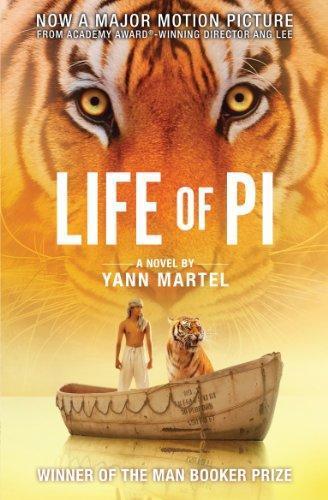Orlion reviewed Life of Pi by Yann Martel
Review of 'Life of Pi' on 'Goodreads'
2 stars
"Life of Pi is a masterful and utterly original novel that is at once the story of a young castaway who faces immeasurable hardships on the high seas, and a meditation on religion, faith, art and life that is as witty as it is profound." That's a pretty tall order to fill, Mr. Book-Synopsis. And, of course, the book itself does not shy away from raising expectations. Within the first few pages, we are told that Pi's story will "make us believe in God" (not to be confused with "prove God exists") and the end of the first part says, "this story has a happy ending" as if to assure the reader that, even though the narrative will be harsh and cruel we can rest assured that every thing turns out all right.
How does it fare in meeting these promises? In my opining, it does not. It relies on cheap authorial tricks and Chick-Tract like logic and dialogue to make its point on religion and faith and "making us believe in God." Most of this book just lacks plausibility, soul, and attention to the writing. Fine, Martel is a competent writer (he can get the story across)... but competence is not "masterful" and is usually not "utterly original".
Well, is there anything good about the book? Sure. Let's face it, there has to be something in a book that has sold many, many copies and is beloved by hundreds of thousands. The idea of being stranded at sea in a lifeboat with a fullgrown tiger is intriguing. Pi's ingenuity in surviving this circumstance is well-thought out, and further set up in the first part when the narrator talks about animals and their behaviours. Unfortunately, this is only a part of the book. The beginning tries to establish Pi as quirky and spiritual... both of which are forced and not pertinent to the story. Let me rephrase that, being a practitioner of three major religions was unnecessary to the story. None of the "spiritual insights" could have been gained exclusively from one of three religions. Maybe that is the point, though I doubt it. When he tells of his conversion to all three religions, it seems like he follows each one because each has something to offer that the other does not. The fact that one can read "all religions offer the same insights to the spiritual" and "all religions contribute something unique to spirituality" from the opinions of the same character is... shoddy workmanship, not "masterful".
Towards the end, there is an event... well, you'll know it when you get to it. Essentially, at this point Martel seems determined to undermine the integrity of the narrative given by Pi. Once again, could be the point, given the "make you believe in God" goal of the book... but it seems odd that something that was well-thoughout throughout all-of-a-sudden becomes berserk and unreal. It seems out of place and out of character.
This is not a bad book, but it is very forgettable. It is not convincing mainly because the book itself has lost focus about what it wanted to do along the way. When it suddenly remembers, it is bogged down with various amounts of superfluous detail which ultimately did not reinforce the "ending effect".
If you're a casual reader, go ahead and read it, it's a casual read. If you're in the mood for something insightful, you may want to wait until you are in a different more receptive mood before you read Life of Pi.

